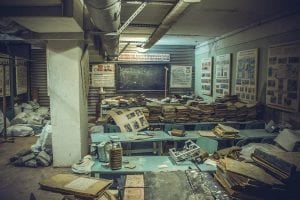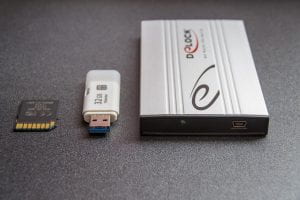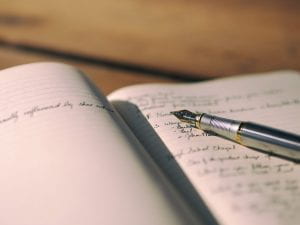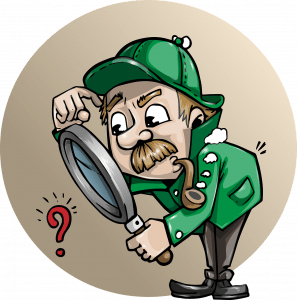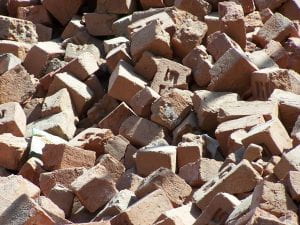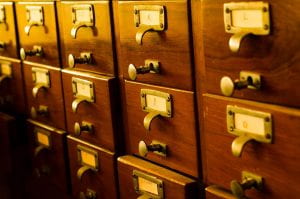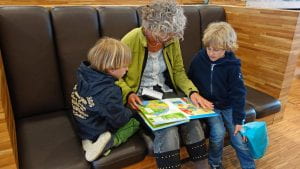A great chat tonight about what books we use as part of our family history research.
What are your favourite genealogy/family history books? Share the names and the focus of the content eg Ireland, Australia, NZ Do you read books about where your ancestors lived? Fact or fiction?
I take Surnames of Ireland by MacLysaght, @Irish_Genealogy‘s book & Brian Mitchell’s Genealogical Atlas of Ireland off my shelf most.
Taming A Plateau .. A History of the Beechmont District #GoldCoastHinterland #Queensland My mother and father met in the Beechmont area, my Dad was teaching, and Mum came home to her family on the mountain for the weekend.
Haven’t been reading much at all from books recently so, this evening I will be looking for good ideas (and either this question is early or my clock is wrong!)
Depends why I am researching – for a biography I will certainly check out books and websites about the area they lived in and why they might have moved there.
I use a book written about my husband’s mother’s family from Cornwall to Southland. It is good for giving who the families are, but the dates are not always accurate – and people are missing.
For my family there are a couple of useful books. Sailors and Settlers. Migration from Nova Scotia to Waipu, Northland. Many of my father’s family in that. And my mother’s features in Guardian of the Valley, the story of Christ Church, Taitā, Lower Hutt.
I just ordered a book on Bruff, Co. Limerick yesterday, where one ancestral family came from. It’s local history but interested to see the names of families, etc.
I have books relevant to my history. Victoria University of Wellington: 1899 – 1999. Away from Home: The Story of Victoria House. The WEL Herstory: Women’s Electoral Lobby in NZ 1975 – 2002. Plus reports and brochures. Plus reports I wrote on history.
I used to read a lot of historical novels … can be useful for getting a flavour of time and place.
I usually find the book I am reading is my current favourite. I know many of the books I read should be used more as reference books however by reading the whole book I think I absorb more FH knowledge and therefore skills.
My favourite genie/FH books relate to the places my ancestors came from, Irish history mid-19th century, the Irish Famine, Immigration/Emigration. You can see my favourite books on my blog at cassmobfamilyhistory.com/book-info/
so many books to choose from. I’ll be posting some photos. The first book Phillimores is probably very predictable. And Grenham’s is a testament to fine scholarship.
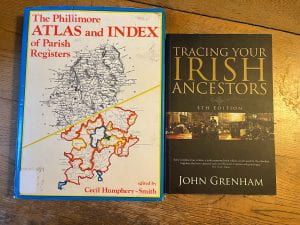
Here’s a couple more. The Digging for Diggers is wonderful for researching military ancestors in Australia. And Nick Vine Hall’s book is probably a bit old now but still useful.
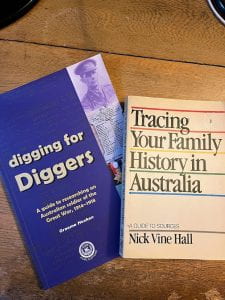
These next two are great reference books I picked up 2nd hand. Evidence Explained helps me when I’m citing my sources and the Mechanical Eye is great for photo research in Australia.
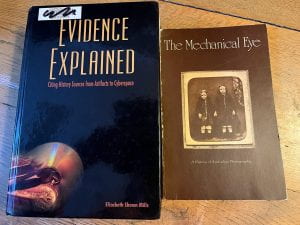
The Featherston Chronicles: A Legacy of War has information about my father’s role in the prisoners of war riot at the Camp in Featherston. He was on the roof with a rifle and fired shots at the rushing throng. He testified at the Enquiry.
Farewell my children by Richard Reid is one of my favourites, Oceans of Consolation (Fitzpatrick), Dorfprozelten Teil II has been invaluable for the Bavarian immigrants from that village. Argyll 1730-1850 (McGeachy) Robert Dunne (N Byrne).
I used to read historical novels too. Philippa Gregory is one of my favourites. Which reminds me I have one that is unread sitting somewhere.
Nick Vine Hall was my first FH book.
Made my think how useful the local societies are great for having a range of books to read. Especially local books. Reading the books / references @MargLBailey has been mentioning brought this to mind and made me realise how you can be far from home.
I think photography books are so useful and among my most frequently used books.
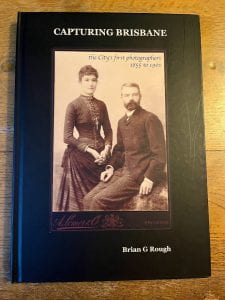
I particularly liked Is history fiction by Curthoys and Docker.
Some of my collection of genealogy books here https://t.co/S8SGPp8MSz
One of the first FH books I bought was Pauline Litton’s Pitfalls and Possibilities in Family History Research. Have bought so many books since then! Gibson Guides great for English records, Grenham for Irish.
Walter Macken’s books a set during the Irish Famine are evocative.
AND the books I read most are those I download from the Internet Archive, Google Books, etc on clan and family histories. I have quite a few I consult often. Wonderful they are available and free.
#ANZAncestryTime This book was invaluable when I started 20 years ago pic.twitter.com/lMeIRZ3swR
— Catherine Clarke (@CathyClarke77) July 19, 2022
I have quite a few of the ‘Tracing your…’ books which I have as Kindle versions. I tend to use as reference mostly. I don’t really get time to read much these days, except at bedtime when I just fall asleep…
May I recommend a #Book for those researching Ontario Ancestors… Genealogy in Ontario 4th Edition by Brenda Dougall Merriman ogs.on.ca/product-catego…
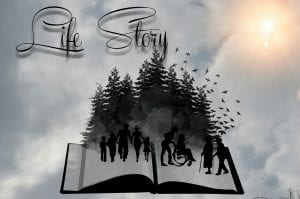
How do you find your next great genealogy/history read? Are you in the process of writing your family history in a book? What format will you use?
In the good old days I found interesting books at conference book stalls and speakers books. Now I read mostly online – not really proper books – sometimes white papers, sometimes blog posts. I usually save them and read later.
I am slowly writing my autobiography. I need to get serious about doing it. I write notes when I think of a topic. I haven’t decided how I will stick it together. I have a lot of material in spreadsheets and documents to use. I need a professional editor.
I listen to podcasts – family history – e.g. the Genealogy Guys and ABC’s Bookshelf and read genealogy mags. That’s usually more than enough suggestions.
Years ago I thought I might like to write about about the experiences of a working woman. Never got over thinking I would like chapter 6 to be called Boys Talk. All about how in a meeting some people do not listen and present others ideas as theirs. Decided that I should get over being so bitter about corporate life and get on doing things I loved doing. Is not doing genealogy so much better?
currently taking a shortcut to writing a family history and using photos with captions to make a #familyhistory photobook
I like the idea of themes with autobiographies unless there is an overarching theme over the decades.
I published my Kunkel family history in hard back. I can’t believe that’s nearly 20 years ago. I have two in drafts that need a lot of updating and editing. My energy levels aren’t what they were, sadly
the Hazel Edwards ones have some good ideas
Not that I have any experience writing books – I think that a good editor can help bring it all together. You have interesting topics. Not sure if anyone has written a history of computing in NZ especially from someone on the ground at the time. Interests me.
This Friday I am helping some people start writing their family stories on a blog.
I have mainly been reading fiction from authors like @NathanDGoodwin and others recommended in the facebook group for genealogical authors

How do you manage your personal library of digital or hard copy books? Do you mainly purchase your research/reference books or borrow from a library?
Mine are all in my Kindle App in Collections. I also add them to Zotero, which you can do straight from Amazon with one click. I have one folder for the books I’ve bought and another one called ‘Wishlist’ 🙂
If I wanted to start cataloguing all the books I have at home, what would you recommend I use online?
Zotero. There is a Chrome Extension that if you are on the Amazon page for your book you can add all the details with one click. You can add tags/notes and file the entry in multiple folders at once without duplicating it. And its free! And backed up in the cloud! I love it. I use it for my books, but also for all my saved resources eg conference handouts, blogposts. Can file in multiple folders and add tags for easy search/retrieve.
Definitely librarything.com as you can choose which library or organisation has done the cataloging, books with barcodes can be scanned in via app, great search interface too all free for personal use librarycat.org/lib/crgalvin 2 posts here carmelgalvin.info/search?q=Libra…
Libib is the app he used for his 3000 books . Delighted with it
I have my books on LibraryThing but fear it’s sadly out of date. I note on GoodReads whether the book I’ve read is my ebook, a library book or on my shelf.
I like to buy ref books. Historical fiction from library or Kindle. Dithering over Advanced Genetic Genealogy though. The library has a copy which I’ve read, but at €50, I’m not sure how much use to have on the shelf when the tech is changing so fast.
I have the Bettinger books but not this one. They are useful for understanding the background and how it helps your FH.
Plus so much is online and with a complicated topic smaller bites of material is sometimes easier.
One of the reasons I like digital is that we used to move lots. We used to have large, heavy solid wooden book cases. One day I donated most of the books to the book sale at the school fete. Since then we share most books and keep a few special favourites.
My books in their location are all on a ssheet. Most are very old. I don’t buy hard-cover now. I’m trying to get rid of them, but it’s hard. I gave my children books (1940s/50s) to my nephew for my g-niece this year. Digital in folders by topic.
I love old children’s books too – Violet Needham and Nina Bawden, Arthur Ransome and of course the ubiquitous Enid Blyton.
I still have all my old children’s books – Enid Blyton, Malcolm Saville, W E Johns, C S Lewis, Agatha Christie, Dick Francis 🙂
I find it easier to read paper books, but I need to downsize. I don’t often borrow from the library. I don’t have time to read them.
I am a crime/police procedural tragic. Authors and books I’ve loved for years: Tara French, Michael Connelly, the Rebus books. Have recently discovered the Louise Penny series about Inspector Gamache. Also an excellent book by @damyantig You Beneath Your Skin.
I read both hard copy and digital books. With the latter I always have them with me, can look up places or words easily. I also find them easier to read an night.
I mainly go for digital books now as I can read them any place anytime. I do like reading old novels so they download for free. Plus I have the bad habit of reading multiple books at a time. I can even leave a book for a year or so and go back to it.
I find Kindle is easier for my bad eyesight now, being backlit and can increase font size. I struggle with normal books these days. Also, I always have access to my entire library wherever I am.
I usually buy hard copy books for reference reading but also love that I can buy digital copies for some. I am a fan of highlighting and adding comments to my reference books
mainly digital nowadays and try to remember to add them to my LibraryThing librarything.com account other wise I might buy twice or indeed read Historical fiction, my favourite genre twice
I tend to borrow historical fiction from the library, and buy non-fiction (usually hard copies, but Kindle versions if necessary/impatient!)

Are you an avid reader? What other genre do you favour? Share some authors or titles we can read. Share your favourite reading spot (photo or words) and maybe a pic of your To Be Read pile. Favourite tipple or snack while reading.
Not since I found online genealogy. Reading has almost disappeared from my life. I’m busy trying to solve the next DNA match or find the next record!
golden age detective fic, crime, fantasy. Anything really. TBR pile is largely non-fic, that I haven’t been in the right mood for!
yes, avid reader of historical fiction and lately Australian rural fiction, light stuff but fun. Chocoholic. Digital, digital Local library has BorrowBox and Libby – the genealogy/ family history magazines are all available in Libby
Good reminder to look at the FH mags at the library, thanks Carmel. I have mixed luck finding what I want for books at the library.
These days, when I read, I read for information and, more often than not I hunt down what I want to find online. I haven’t bought an actual book for a while
I used to be more so – used to read about 3 books a week. I love crime, historical mystery stories eg Paul Docherty. fantasy eg Robin Hobbs. Loved the Outlander series.
I read for at least an hour most mornings. It’s usually news or FH news looking for something to share on Caloundra Family History FB page. I often get distracted, say down a scientific DNA paper & have remember to come up for air. I might try a book tomorrow.
Jennifer Jones recommended this book a while ago. On my TBR list. Writing True Stories by Patti Miller .
Readers: Maybe you would like to answer the final question and leave a comment on this post.
